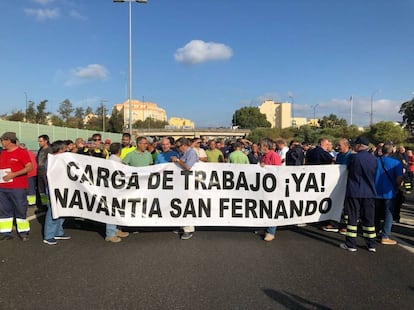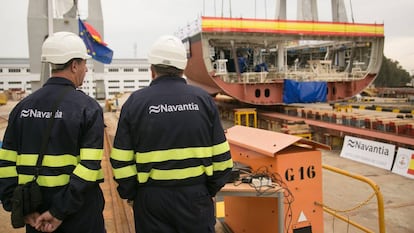Spain saves Saudi contracts after averting diplomatic row over missile sale
Bilateral business came under threat following reports that Madrid would halt sale of bombs that could be used in Yemen war

The Spanish government has stated that a crisis over the construction and sale of five warships to Saudi Arabia has been “deactivated.” For a week, Madrid and Riyadh have been engaged in a flurry of diplomatic exchanges following a news report that Spain would cancel the sale of 400 laser-guided bombs to Saudi Arabia over the risk that they might be used in the ongoing conflict in Yemen.
The news prompted Riyadh to say that if so, all other contracts with Spain could face termination, representing tens of millions of euros in projects ranging from the bullet train to Mecca to the Riyadh subway system.
The Spanish government said “there will be no Saudi reprisals”
A major diplomatic confrontation was averted following Thursday and Friday meetings between Saudi ambassador Prince Mansour Khalid Al Farhan Al Saud, Defense Minister Margarita Robles, Foreign State Secretary Fernando Valenzuela and Central Intelligence Center (CNI) director Félix Sanz.
Government sources said that relations have returned to normal and that “there will be no Saudi reprisals.” But other sources said that there will be “a price to pay” for the incident and that it will be difficult “to restore trust.”
The crisis began when Spain’s Cadena SER radio station revealed that the Defense Ministry had decided to halt the sale of 400 US-made guided missiles that might be used in the war in Yemen, where a bomb attack against a bus killed dozens of civilians on August 9. According to the news agency AFP, which cited the UN undersecretary-general for humanitarian affairs Mark Lowcock, at least 22 children and four women were killed by a Saudi-led coalition air strike while fleeing fighting in Yemen.

News of the cancellation was viewed as an offense by Riyadh. While keeping silent in public, the Gulf nation issued “very serious warnings” about the consequences of going ahead with an “unfriendly” decision, said a source familiar with the situation.
Riyadh used various private channels to convey to Madrid that if the sale was halted, other contracts would be at risk, including the purchase of five Spanish-made corvettes worth more than €1.8 billion. Workers at the Cádiz-based shipyard Navantia, where the contract represents jobs for 6,000 people, staged public protests, and Andalusian premier Susana Díaz demanded “guarantees” that the warship contract would be preserved.
On Friday, Madrid said the decision to cancel the bomb sale was merely “a statement of intent” that had not been implemented. The contract was signed by the previous Popular Party (PP) administration, and Riyadh has already paid the full amount of €9.2 million.
Sources said that if the matter had not received public exposure, Spain could have found a technical pretext to avoid delivering the missiles without mentioning the Yemen conflict, which the Socialist (PSOE) administration of Pedro Sánchez has been sensitive to.
Saudi Arabia is the top buyer of Spanish military equipment outside NATO countries, and invested €270 million last year, according to figures released by the State Secretary for Trade. Over 6% of all Spanish military exports end up in Saudi Arabia.
English version by Susana Urra.
Tu suscripción se está usando en otro dispositivo
¿Quieres añadir otro usuario a tu suscripción?
Si continúas leyendo en este dispositivo, no se podrá leer en el otro.
FlechaTu suscripción se está usando en otro dispositivo y solo puedes acceder a EL PAÍS desde un dispositivo a la vez.
Si quieres compartir tu cuenta, cambia tu suscripción a la modalidad Premium, así podrás añadir otro usuario. Cada uno accederá con su propia cuenta de email, lo que os permitirá personalizar vuestra experiencia en EL PAÍS.
¿Tienes una suscripción de empresa? Accede aquí para contratar más cuentas.
En el caso de no saber quién está usando tu cuenta, te recomendamos cambiar tu contraseña aquí.
Si decides continuar compartiendo tu cuenta, este mensaje se mostrará en tu dispositivo y en el de la otra persona que está usando tu cuenta de forma indefinida, afectando a tu experiencia de lectura. Puedes consultar aquí los términos y condiciones de la suscripción digital.








































